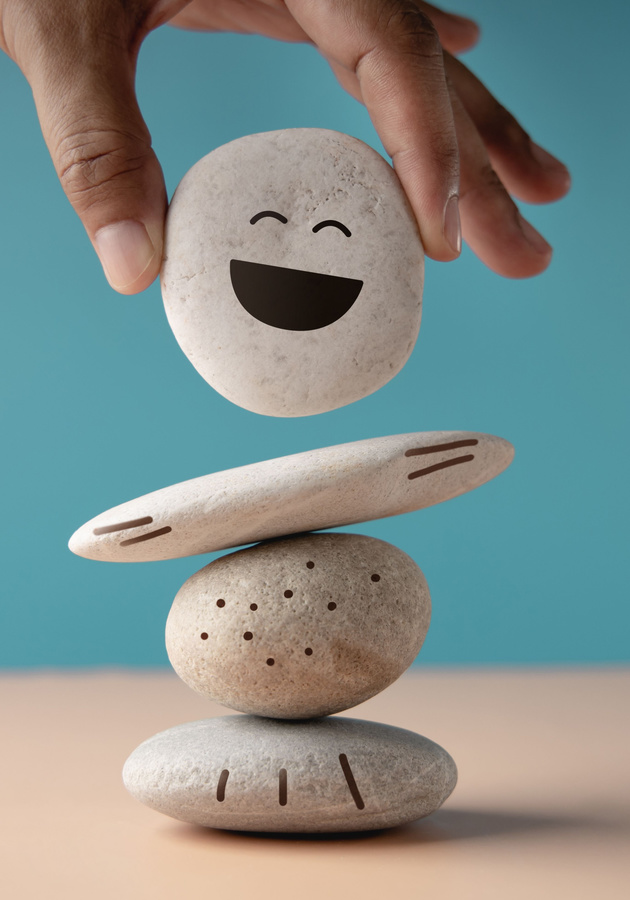In April 2015, two of the greatest spiritual leaders of our time, the Dalai Lama and Desmond Tutu, Archbishop of Southern Africa, met in Dharamsala to celebrate the Dalai Lama’s birthday. During the one-week encounter, the two longtime friends discussed the meaning of joy. “The Book of Joy” presents their inspiring dialogues and shows how a happier life is not only possible, but within our grasp. Get ready to learn how to live a joyful life!
What is joy?
The way we live and experience our lives is not dependent on outer influences, but on ourselves. We choose to see the world as we do, and this means that we alone have the power to make ourselves happy.
According to the Dalai Lama, the purpose of life is to be happy. Moreover, every one of us has a responsibility to make the world a happier place. By connecting with ourselves and with others, we can create happiness. Our minds and hearts are the key to a happy life. This is true for anyone, whether you believe in God, or not. Indeed, the Dalai Lama says that out of seven billion people, one billion of them are atheists - and every single human has the right to be happy, so faith is not important.
What’s important is to educate our inner values. Joy is not the same as happiness because while happiness is a fleeting state, joy is everlasting. While happiness depends on external forces, joy is found internally. Most importantly, chasing happiness won’t make you happy. Joy is a by-product of how we conduct ourselves, every single day.
The key to joy is to realize that you are not alone. You are one of seven billion humans on this planet, and you are connected to all of them because of your humanity. Especially in times of great disaster, many people remember this connection. For example, when an earthquake takes away the homes of people in one part of the world, people from all over the globe will care about those people they have never met.
In South Africa, this idea is expressed through the concept of Ubuntu, which says that a person is a person through other persons. We are made to be compassionate and to share with others. You, for example, would not be in this world if it were not for two other people, your parents.
We are social beings. And being with others - seeing ourselves in relation to others and being helpful to others - ultimately makes us happy. Focusing on our own joy and happiness allows us to be there for other people as well - even research has shown that unhappy people are less social than happy people. So by focusing on your own happiness, you will ultimately create a happier world for those around you as well.
There is no joy without suffering
Nothing beautiful in life comes without pain. Just think of a mother giving birth to a child. The minute she holds her baby in her arms, all the pain of childbirth is forgotten in the joy of looking into her child’s eyes.
Intense suffering is also necessary to develop compassion. When the Dalai Lama visited the holiest place of pilgrimage for Buddhists, Bodh Gaya, he was suddenly seized by a terrible pain in his abdomen. He was rushed to the hospital and the whole way there he was suffering intensely, at least physically.
But then, the car passed an old man lying on the ground who looked like he was dying, and the Dalai Lama felt the man’s suffering so acutely that it took him out of his own pain for a moment. By developing compassion, you can transcend even severe physical pain.
Being too self-centered is the source of pain. As the Dalai Lama puts it, “We have to take care of ourselves without selfishly taking care of ourselves.” Thinking too much about yourself and how you are good or bad will only cause you suffering.
Take fear and anxiety as an example. Everyone feels fear, and it is a useful feeling to have in some situations. It developed so that our ancestors would run away when they would see a lion. Fear is a survival instinct, but when overindulged, it creates anxiety and stress.
Both of these feelings make it extremely hard to be joyful. Stress makes you feel out of control - like you cannot handle the ever-increasing demands of the modern digital world.
A lot of anxiety and stress stems from being too self-centered, generally from ambitions or expectations that are set too high. Consequently, a lot of it also stems from seeing yourself as separate from others. If however, you focus on others as well as yourself, you can transcend these feelings.
For example, the Archbishop handles his insomnia by thinking about all the people that are still awake around the world. Putting himself into the minds of other people makes him worry less about himself and allows him to sleep. The Dalai Lama echoes a similar feeling. He prefers to see himself as a human rather than as the Dalai Lama, because this makes him feel less alone. After all, seeing yourself in terms of your humanity means there are seven billion other people out there to share your burden.
The four pillars of the mind
An important question remains: if suffering is a part of life, how is it possible to be happy? The answer is that since joy comes from the heart and the mind, it is possible to feel joy - regardless of the challenges in life - by developing certain qualities.
There are eight pillars of joy in total, and the four are qualities of the mind: perspective, humility, humor, and acceptance. Our perspective is the way we see the world. So, to be happy, you must change your perspective on things.
Just think of an astronaut looking at Earth from space - everyday problems and worries must feel insignificant from up there. The Dalai Lama also used a different perspective to reframe his exile. Because of the Chinese occupation of Tibet, the Dalai Lama has spent the last half century in exile. Even though he lost his home country, he chose to focus on the new relationships he formed and the possibility of discovering the world.
The second pillar of joy is that of humility. By seeing yourself not as lesser or more than others, you are able to focus on your common humanity. But if you feel you are different from others, you isolate and separate yourself. You create loneliness in your mind.
The third pillar of joy, humor, also breaks down the barriers that separate us. Interestingly, the words humor, humility, and humanity all stem from the same root, humus, which means earth. Laughter has been proven to be good for your health and being able to laugh at yourself brings you onto a common ground with others.
When Desmond Tutu held funeral speeches in apartheid South Africa, he often used humor to diffuse the tension. He noticed that the people who took themselves the least seriously and laughed the most were the ones really struggling to know where their next meal would come from or who did not have a job.
The fourth pillar of the mind is that of acceptance. Accepting the situation allows you to engage with life on its own terms. Acceptance is the opposite of resignation and defeat - it does not mean you are giving in! But a lot of suffering in life comes from reacting to life’s struggles, rather than accepting them.
Just imagine you have a difficult neighbor. You can either criticize and judge him and live in fear and despair because you do not have a good relationship. Or you can accept the situation as it is. You have no control over the thoughts and feelings of your neighbor, but you can develop compassion for him. You can try to improve the relationship, and whether it works or not, at least you have tried.
Acceptance can be achieved through meditation. Much of Buddhist practice is geared towards accepting life as it is, and one of the central teachings is this: “Why be unhappy about something if it can be remedied? And what is the use of being unhappy if it cannot be remedied?”
The four pillars of the heart
In addition to the four qualities of the mind, there are four qualities of the heart: forgiveness, gratitude, compassion, and generosity.
The fifth pillar of joy is that of forgiveness. Being able to forgive is a quality we all have. No matter how terrible the transgressions against us, forgiveness ultimately makes us feel better. In fact, forgiving others has been shown to reduce stress hormones in the brain. Take the Truth and Reconciliation Committee in South Africa as an example, which investigated the atrocities committed by the apartheid government in South Africa.
One of the events that was looked into was that about a group of young people who had been lured into a booby trap and killed. Afterward, their bodies had been dragged through the streets. One mother switched her TV on to see the corpse of her son being dragged. At the committee, the perpetrator of the crime asked for forgiveness. Amazingly, the mother stood up, embraced him, and said, “My child, we forgive you.” Forgiveness expresses a true nobility of spirit.
The sixth pillar of joy is gratitude. Being grateful changes your perspective on the world: it turns a half-empty cup into one that is half-full. Gratitude also enhances the connection with other people. Just think about all the refugees who do not have a roof over their heads or a nice, warm bed - things that you can be grateful for. So instead of focusing on what you might lack, shift your perspective to see the abundance in your life.
The seventh pillar of joy is compassion. According to Buddha, compassion is the virtue that allows you to possess all other virtues as well. We all learn compassion, a deep caring for others, from our mothers who nurture us. But compassion is a skill that needs to grow through practice. Pain becomes more bearable when, rather than thinking about your own suffering, you try and see how you can be helpful to others.
Closely connected to compassion is the eighth pillar of joy, generosity. Do you enjoy giving gifts more than receiving them? You are not alone in that. Studies have shown that the reward centers in our brain light up as strongly, if not stronger, when we receive a gift and when we are being generous. When you give something, you literally feel like you are being given to.
We are fundamentally good people. This can be seen especially in areas that are ridden with poverty, such as South African townships. People who have nothing still share the little they have with others.
Final Notes
Human beings are social animals. We cannot be happy when we only focus on our selfish needs and ambitions. True happiness and lasting joy are found in a life spent in connection with others. Through compassion, generosity, forgiving, and gratitude, we are able to transcend our own pain. Humility and humor break down the barriers between ourselves and others. And through acceptance and perspective we can see our lives clearly whilst finding happiness.
12min Tip
Why not start the morning with intention setting? Start the day by thinking about what you desire for yourself and others and by setting a specific intention for the day ahead.





























